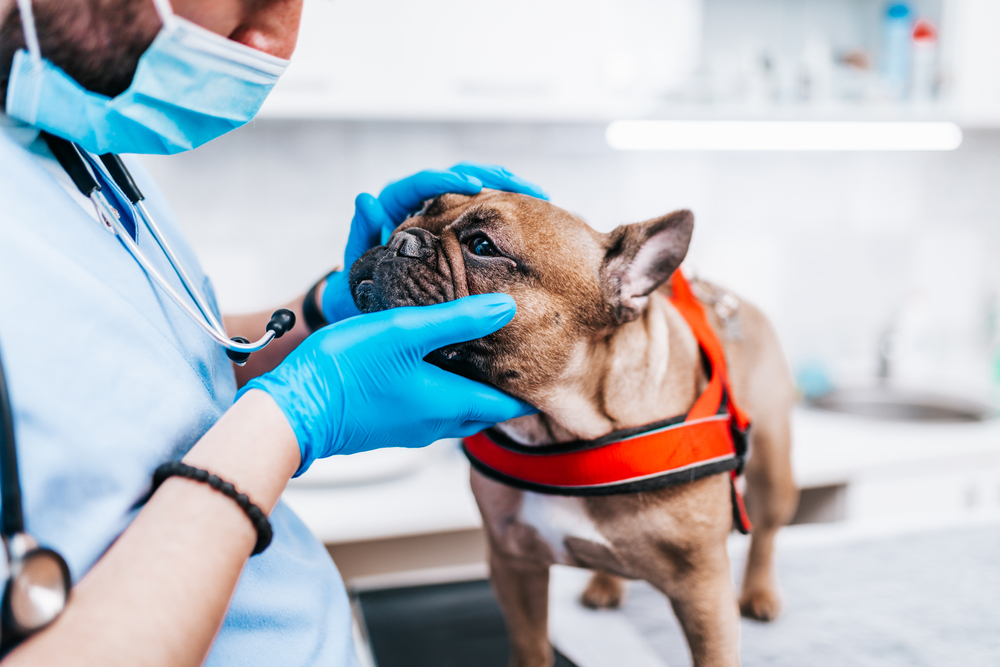Essential Tips for Keeping Your French Bulldog Healthy
French bulldogs are simply delightful, and with their charming bat-like ears, affectionate nature, and compact size, Frenchies make excellent companions. However, owning a French bulldog requires a deep understanding of their unique needs, especially because they are brachycephalic (i.e., short-nosed). Our Monte Vista Animal Hospital team’s comprehensive guide walks you through French bulldog essentials, including their specific health issues and how to address them.
Understanding brachycephalic dog breeds
Brachycephalic breeds, such as the French bulldog, have a distinctive skull shape characterized by a short, broad head. This adorable feature, while endearing, causes health problems caused by their small airway and compact facial anatomy. These dogs often experience breathing difficulties, dental problems, and other health issues that require special care.
Brachycephalic obstructive airway syndrome in French bulldogs
One of the most common health issues French bulldogs face is brachycephalic obstructive airway syndrome (BOAS). BOAS signs include:
- Noisy breathing
- Snoring
- Excessive panting
- Gagging or retching
- Regurgitating or vomiting
- Exercise intolerance
- Heat sensitivity
- Sleep apnea
Managing this condition involves several strategies. Weight control is crucial, as keeping your Frenchie at a healthy weight reduces the strain on their respiratory system. Exercise should be moderate, with short, leisurely walks being ideal and vigorous activity avoided, especially when the weather is hot or humid. Keeping your home cool is also important, and using fans or air-conditioning can help. If your Frenchie’s breathing difficulties are severe, surgical intervention may be necessary to widen their nostrils or shorten their soft palate to improve their breathing ability.
Intervertebral disc disease in French bulldogs
Intervertebral disc disease (IVDD) is a significant health issue in French bulldogs, characterized by the degeneration and potential herniation of the discs between the spinal vertebrae. This condition can lead to severe pain, mobility issues, and paralysis. IVDD signs include sudden back pain, reluctance to move, incoordination, and uncontrollable bladder or bowel.
Prompt veterinary intervention is crucial, as treatment options range from anti-inflammatory medications and strict rest to surgical intervention in severe cases. Preventive measures include maintaining a healthy weight, using a harness rather than a flat collar, avoiding activities that strain the spine, and providing supportive bedding.
Skin fold dermatitis in French bulldogs
Another common issue in French bulldogs is skin fold dermatitis, a skin infection that occurs between the skin folds, often around their face and tail. Signs include redness, itching, odor, and discharge.
To prevent your Frenchie from developing skin fold dermatitis, regularly clean between their skin folds with a damp cloth and dry the skin thoroughly. Medicated wipes may be necessary to prevent bacterial or yeast infections. Regularly check for irritation or infection and carefully assess your Frenchie each time you clean their skin folds.
Dental disease in French bulldogs
Dental concerns are common in French bulldogs because of their brachycephalic skull structure, which often results in crowded or misaligned teeth. Dental crowding can make keeping their teeth clean difficult, leading to plaque buildup, tartar, and periodontal disease.
Regular dental care is essential to prevent dental issues, including daily toothbrushing with dog-specific toothpaste and routine professional cleanings by our veterinarian. In addition, you should give your Frenchie dental chews that help reduce plaque. Regularly monitor your French bulldog for dental problem signs such as bad breath, red or swollen gums, and difficulty eating. Early dental disease detection and treatment help maintain your Frenchie’s oral health and overall well-being.
Eye problems in French bulldogs
French bulldogs are prone to several eye issues, including cherry eye, corneal ulcers, and dry eye. Regular veterinary checkups are essential to monitor your Frenchie’s eye health. Regularly cleaning around your dog’s eyes with a damp cloth can help prevent irritation. Be vigilant for eye problem signs, such as redness, excessive tearing, or cloudiness, and seek veterinary care promptly if your French bulldog exhibits any of these.

Digestive issues in French bulldogs
Digestive problems, such as gas, vomiting, and diarrhea, are common in French bulldogs. Feeding a high-quality diet formulated for small breeds can help your dog avoid these issues. Using a slow feeder bowl can prevent your Frenchie from gulping air while eating, which can cause gas. Avoid feeding your dog table scraps and stick to their regular diet to prevent gastrointestinal upset.
By understanding French bulldogs’ health problems, you learn to provide your Frenchie with exceptional preventive care to maintain their overall well-being. Schedule an appointment with our Monte Vista Animal Hospital team so we can help keep your French bulldog happy and healthy for years to come.






Leave A Comment